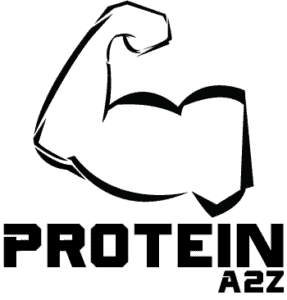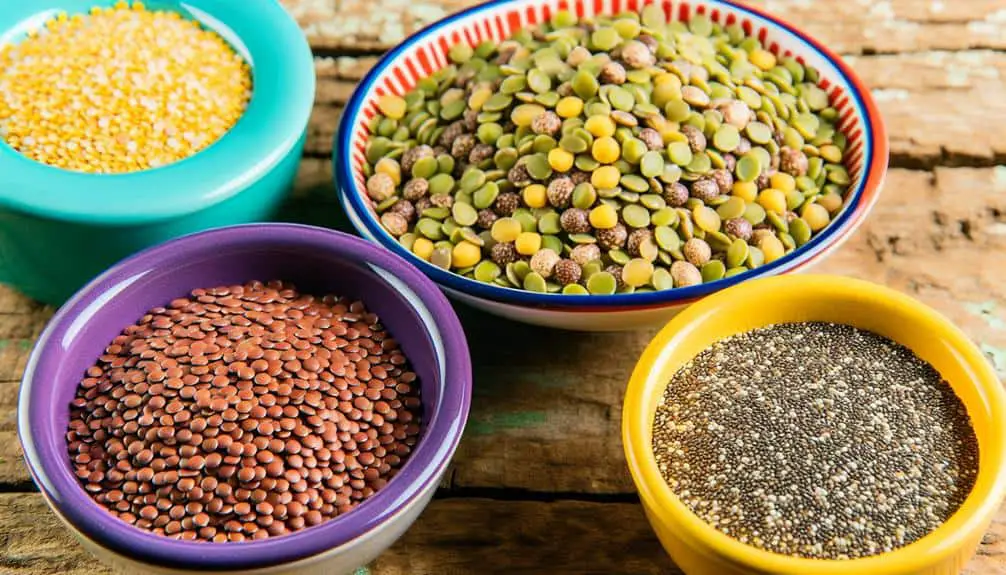Yearning for a change from traditional protein powders? Uncover seven enticing alternatives that will revolutionize your daily intake - dare to explore beyond the
If you've found yourself in a protein powder rut, it might be time to spread your wings and explore new horizons. But where can you turn when the familiar scoop of powder no longer satisfies your palate?
There are seven protein powder alternatives that could be the answer to your quest for variety and nutrition. From plant-based options to everyday pantry staples, each choice holds its own promise of deliciousness and health benefits.
Intrigued to discover what's beyond the protein powder realm?
Table of Contents
Plant-Based Protein Powders
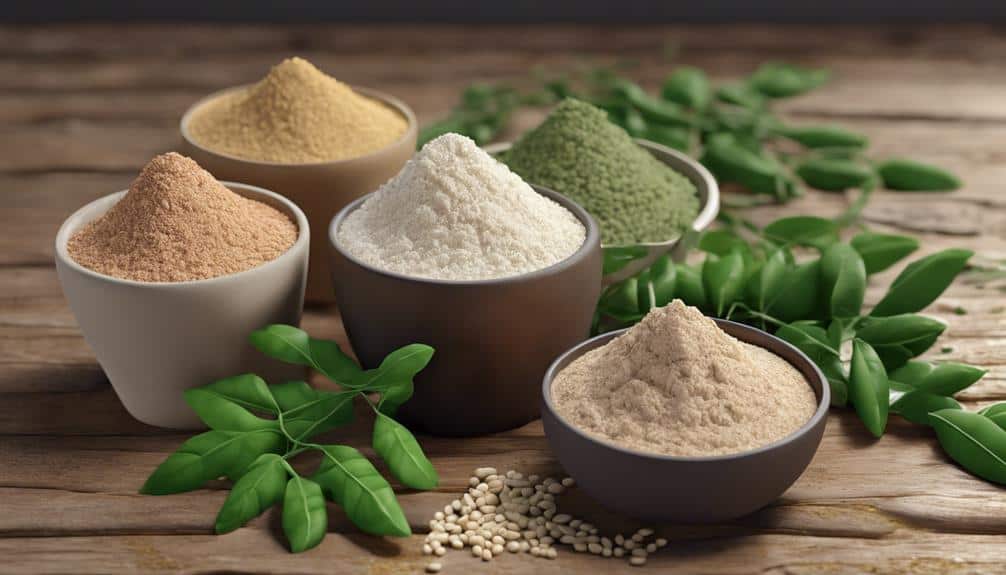
Plant-based protein powders offer a complete amino acid profile and are a great alternative for vegans and vegetarians looking to boost their protein intake. Derived from sources like peas, rice, hemp, and quinoa, these powders provide a high-quality protein source that can aid in muscle recovery and growth.
Not only are plant-based protein powders easily digestible, but they're also free from common allergens like dairy, soy, and gluten, making them suitable for individuals with dietary restrictions. Additionally, these powders are rich in antioxidants, fiber, and essential nutrients, offering more than just protein benefits.
Pea Protein
Pea protein, derived from yellow split peas, offers a complete protein source rich in essential amino acids. This plant-based protein is gaining popularity due to its hypoallergenic nature and easy digestibility, making it a great option for individuals with food sensitivities. A single serving of pea protein powder typically delivers approximately 20-25 grams of protein, making it a convenient way to boost your daily protein intake.
Pea Protein Benefits Table:
| Benefits | Description |
|---|---|
| Complete Protein | Contains all nine essential amino acids necessary for optimal health. |
| Hypoallergenic | Less likely to cause allergic reactions compared to other protein sources. |
| Digestibility | Easily digested, reducing the chances of bloating or digestive discomfort. |
| Muscle Support | Studies indicate pea protein may help in muscle growth and recovery. |
| Weight Management | Can aid in weight loss or maintenance due to its satiating protein content. |
Pea protein stands out as a promising plant-based protein option that not only supports muscle growth but also aligns with various dietary needs.
Hemp Protein
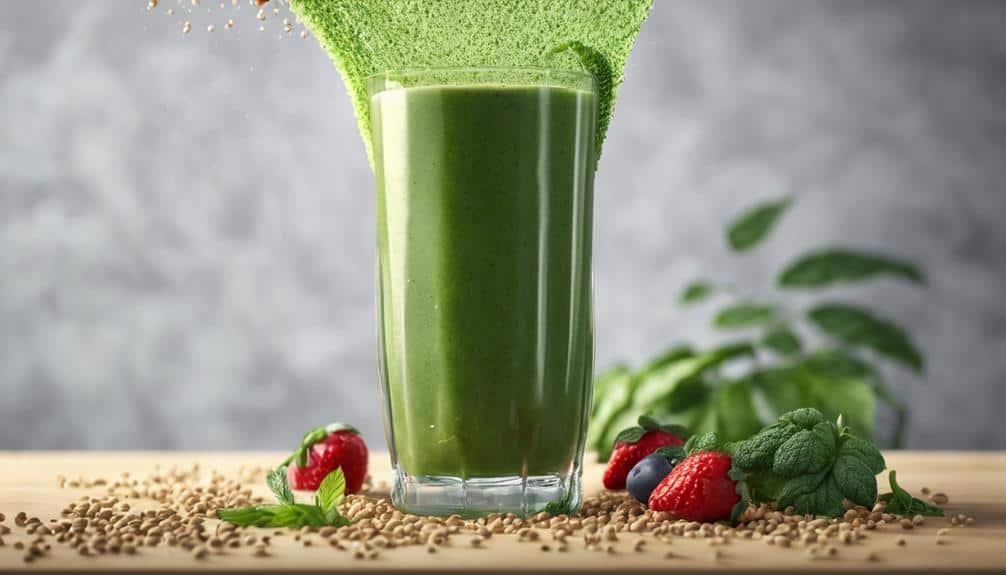
Rich in essential amino acids and omega fatty acids, hemp protein offers a complete plant-based protein source suitable for various dietary preferences. A 30g serving of hemp protein powder can provide around 15g of protein, making it a great addition to your daily protein intake.
Not only does hemp protein contain all essential amino acids, but it's also rich in omega-3 and omega-6 fatty acids, which are beneficial for heart health.
If you have dairy or soy allergies, hemp protein is an excellent alternative as it's easily digestible and doesn't contain common allergens. Additionally, choosing hemp protein is environmentally friendly since hemp plants require minimal water and no pesticides to grow.
Consider incorporating hemp protein into your diet to diversify your protein sources and reap the benefits of this nutritious plant-based option.
Rice Protein
Looking at another alternative to diversify your protein intake, rice protein offers a complete plant-based protein source derived from brown rice, ideal for vegans and those with dairy or soy allergies. Here are some key points about rice protein:
- Complete Protein: Rice protein contains all essential amino acids necessary for muscle repair and growth, making it a reliable protein source for your dietary needs.
- Digestibility: Easily digestible, rice protein is gentle on the stomach and suitable for individuals with sensitive digestive systems, ensuring optimal nutrient absorption.
- Protein Content: With approximately 20-25 grams of protein per scoop, rice protein powder serves as a convenient post-workout option to support your muscle recovery and development.
- Gluten-Free: Being gluten-free, rice protein is a safe choice for individuals with gluten sensitivities or celiac disease, offering a versatile protein alternative.
Incorporating rice protein into your diet can provide a valuable protein source, especially for those looking to avoid animal-based products or common allergens like dairy and soy.
Pumpkin Seed Protein
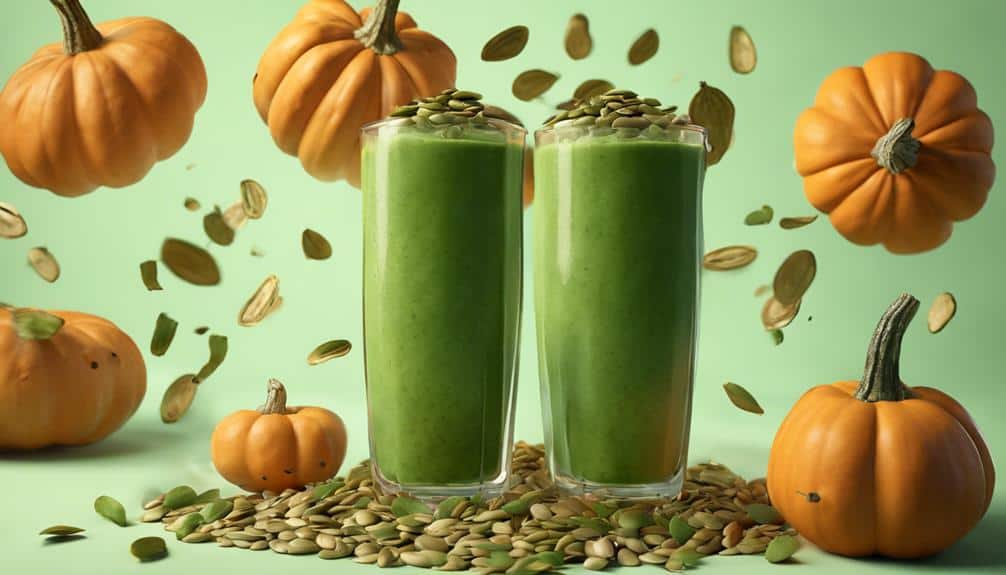
Pumpkin Seed Protein provides a nutrient-dense and versatile plant-based protein option for individuals seeking to diversify their protein sources. Pumpkin seeds are packed with fiber and iron, offering 15g of protein and 30% of your daily iron intake in just 1/3 cup. Additionally, they contain magnesium, zinc, and tryptophan, which can help enhance mood.
These seeds are incredibly versatile and can be easily incorporated into your diet by adding them to smoothies, snacks, salads, soups, or even making homemade pumpkin seed milk. By including pumpkin seeds in your meals, you can effectively meet your protein and nutrient requirements in a natural way. Their nutritional profile makes them a convenient and delicious option to boost your protein intake without relying on traditional protein powders.
Cricket Powder
Consider incorporating cricket powder into your diet as a sustainable and nutrient-rich alternative to traditional protein powders. Cricket powder isn't only a versatile ingredient but also offers numerous health benefits. Here's why you should give it a try:
- Sustainable Protein Source: Cricket powder requires significantly less water and land compared to traditional livestock farming, making it an environmentally friendly choice.
- Nutrient-Rich: Rich in essential nutrients like iron, calcium, and B vitamins, cricket powder provides a nutritious alternative to conventional protein powders.
- Complete Protein Source: With all nine essential amino acids, cricket powder supports muscle recovery and growth effectively.
- Healthy Fats: Low in saturated fats and high in healthy fats like omega-3 fatty acids, cricket powder promotes overall well-being while being kind to the planet.
Incorporating cricket powder into your meals not only boosts your protein intake but also contributes to sustainable food production practices, helping reduce the carbon footprint associated with protein consumption.
Quinoa Protein
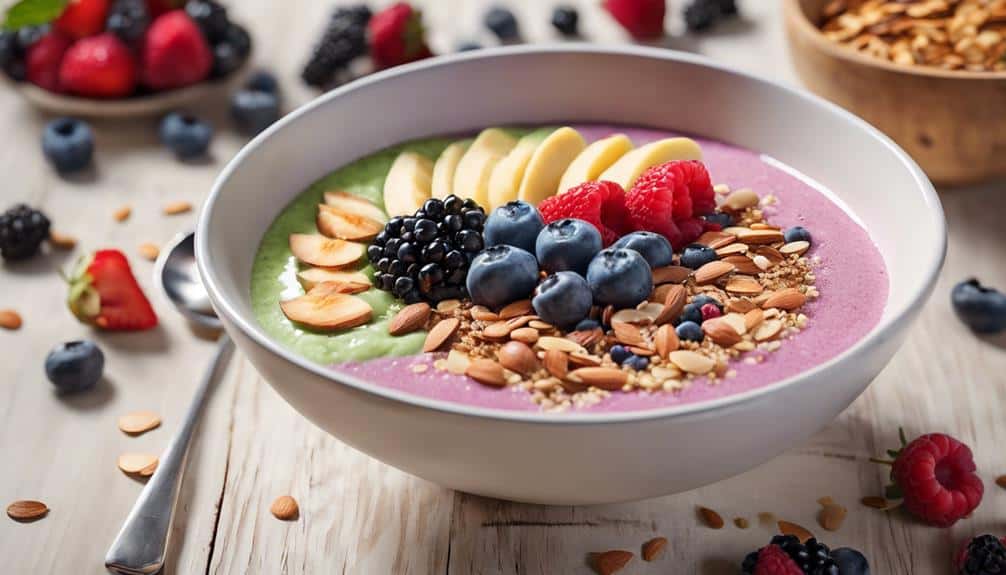
Enhance your protein intake with the versatile and nutrient-rich option of quinoa protein, a complete plant-based source packed with essential amino acids and additional health benefits.
Quinoa stands out as a complete protein source, containing all nine essential amino acids crucial for your body's functions. A single cup of cooked quinoa offers approximately 8 grams of protein, making it a substantial addition to your diet, especially for those seeking plant-based protein alternatives.
Moreover, quinoa is gluten-free, making it a suitable option for individuals with gluten sensitivities or celiac disease. Beyond its protein content, this ancient grain is a powerhouse of fiber, iron, magnesium, and antioxidants, providing a range of health benefits.
Its versatility allows you to incorporate quinoa into various dishes like salads, bowls, soups, and baked goods, making it an easy and delicious way to boost your protein intake while enjoying its nutritional advantages.
Egg White Protein
If you're looking to boost your protein intake with a natural and versatile option, consider incorporating egg white protein into your diet. Egg white protein is a high-quality source of protein, containing all essential amino acids necessary for muscle recovery and growth. Here are some key points to consider:
- Protein Packed: One large egg white provides around 4 grams of protein, offering a convenient and easy way to increase your protein consumption.
- Low in Calories and Fat: Egg white protein is a lean protein source, making it ideal for those aiming to up their protein intake without consuming excess calories or fats.
- Versatile and Digestible: This protein powder alternative is easily digestible and can be seamlessly integrated into various recipes like smoothies, baked goods, and omelettes.
- Natural and Clean: Egg white protein is a minimally processed option, perfect for individuals seeking clean protein sources to support their fitness goals.
Incorporating egg white protein into your diet can be a simple and effective way to enhance your protein intake while enjoying its nutritional benefits.
Greek Yogurt
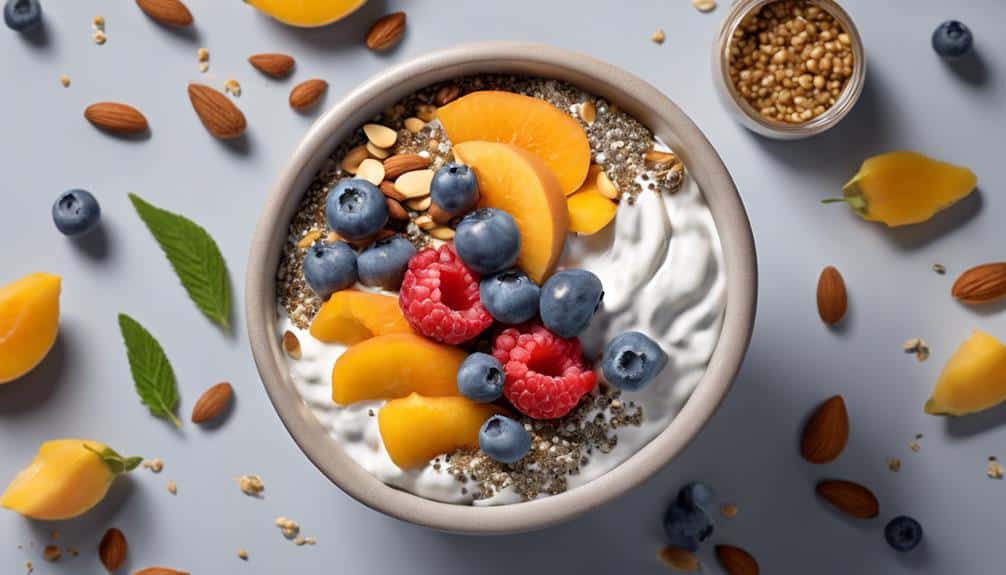
Greek yogurt, with its creamy texture and rich protein content, is a versatile dairy option that can elevate both sweet and savory dishes. Greek yogurt contains approximately 10 grams of protein per 100 grams, making it a protein-rich choice for boosting your protein intake. It is a convenient and delicious way to incorporate more protein into your diet. You can enjoy Greek yogurt in various forms, whether as a standalone snack, mixed into smoothies, or as a base for breakfast bowls. Adding fruits like strawberries and bananas to Greek yogurt not only enhances its flavor but also provides extra nutrients. Here is a table summarizing the benefits of Greek yogurt:
| Benefits of Greek Yogurt |
|---|
| High protein content |
| Versatile in recipes |
| Convenient snack option |
| Enhances flavor with fruits |
| Helps meet daily protein requirements |
Cottage Cheese
Consider including cottage cheese in your diet as a protein-rich and versatile dairy option that can enhance both your sweet and savory meals. Here are some reasons why cottage cheese can be a beneficial addition to your diet:
- Protein Power: Cottage cheese packs a protein punch, with around 14-15 grams of protein per 100 grams, making it a great choice for those looking to increase their protein intake.
- Versatile Ingredient: Whether you prefer it on its own, mixed with fruits, or incorporated into various dishes, cottage cheese can add a creamy texture and a boost of protein to your meals.
- Slow-Digesting Benefits: Rich in casein protein, cottage cheese provides a slow-releasing protein source that's beneficial for muscle recovery and growth.
- Satisfying Snack: With its high protein content, cottage cheese can help keep you full and satisfied, making it a convenient and tasty option for snacks or as a component in meals.
Almond Butter
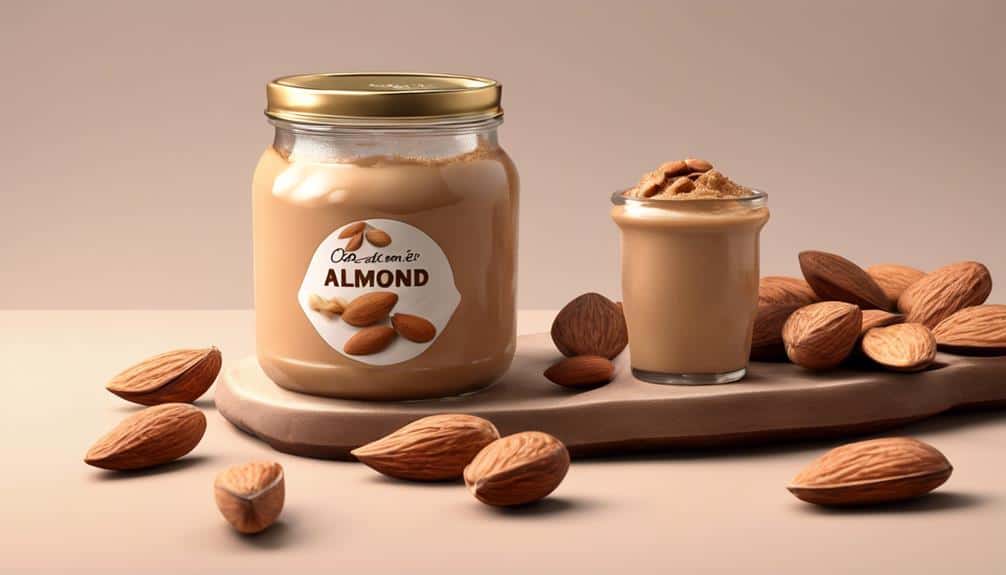
Boost your protein intake with almond butter, a versatile and protein-rich alternative to enhance your meals and snacks. Almond butter contains 6g of protein per 2 tbsp serving, making it a nutritious addition to your diet. Its creamy texture makes it a great choice for spreading on toast, blending into smoothies, or using in dressings and sauces. Besides protein, almond butter is also a good source of healthy fats, fiber, vitamin E, and magnesium. This natural spread is ideal for individuals seeking to steer clear of artificial ingredients often found in some protein powders. For a twist, try incorporating almond butter into your protein shakes for a nutty flavor boost. If you're looking for variety, you can also explore other nut butter options like peanut butter to switch up your protein sources and add delicious flavors to your meals.
| Benefits of Almond Butter | Description |
|---|---|
| Protein-Rich | Contains 6g of protein per 2 tbsp serving |
| Versatile | Ideal for toast, smoothies, dressings, and sauces |
| Nutrient-Dense | Good source of healthy fats, fiber, vitamin E, and magnesium |
| Natural Alternative | Suitable for those avoiding artificial ingredients in protein powders |
Chickpea Flour
How can chickpea flour enhance your meals and provide a protein-rich gluten-free alternative?
Chickpea flour, also known as gram flour or besan, offers a nutritious option for incorporating more protein into your diet. Here's how it can benefit you:
- Protein Content: With about 6-7 grams of protein per 1/4 cup serving, chickpea flour is a protein powerhouse that can help you meet your daily protein needs.
- Versatility: This gluten-free flour can be used in various cuisines to create dishes such as flatbreads, pancakes, and savory snacks, adding a unique flavor and texture to your meals.
- Nutrient-Rich: Apart from being high in protein, chickpea flour is also rich in fiber, iron, and other essential nutrients, making it a wholesome choice for those looking to boost their nutrient intake.
- Daily Intake: Incorporating chickpea flour into your diet regularly can't only increase your protein intake but also provide you with a range of nutrients to support your overall health.
Frequently Asked Questions
What Can I Use Instead of Protein Powder?
If you're looking to switch up your protein sources, consider incorporating Greek yogurt, nuts, seeds, and eggs for added variety and nutrients.
Try experimenting with high-protein smoothies using oats, chia seeds, and nut butter to boost your intake.
For a convenient protein fix, snack on peanut butter, apple slices with nut butter, or overnight oats.
Opt for protein bars like Mocha and Forza on the go.
Explore natural options like Veloforte's Recovery Protein Shakes for substitutes.
How Can I Get Enough Protein Without Protein Powder?
To get enough protein without protein powder, focus on incorporating protein-rich foods like lean meats, fish, eggs, dairy, pulses, nuts, and beans into your diet. Opt for natural protein sources such as peanut butter, eggs, nuts, seeds, and high-protein smoothies. Experiment with alternatives like Greek yogurt, chocolate milk, apple slices with nut butter, and overnight oats for varied protein options.
Choose post-exercise protein from natural sources for optimal recovery.
What Can I Substitute for Protein?
If you're looking to substitute protein, try incorporating natural sources like lean meats, fish, eggs, dairy, pulses, nuts, and beans into your diet.
Consider options like peanut butter, eggs, nuts, seeds, and Greek yogurt for cost-effective protein substitutes.
You can also enjoy protein-rich smoothies, hard-boiled eggs, apple slices with nut butter, or overnight oats.
Experiment with different sources to find what works best for your body and preferences.
How to Get 150g of Protein a Day Without Protein Powder?
To get 150g of protein a day without protein powder, focus on whole foods rich in protein like:
- Chicken
- Salmon
- Tofu
- Greek yogurt
- Cottage cheese
- Eggs
- Lentils
- Chickpeas
- Quinoa
- Almonds
- Pumpkin seeds
- Nut butter
Plan balanced meals with lean proteins, whole grains, and veggies. Snack on these protein-rich foods throughout the day to meet your goals naturally. Your diet can be delicious and nutritious without relying on supplements.
